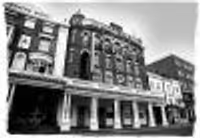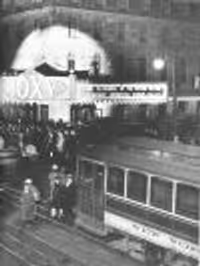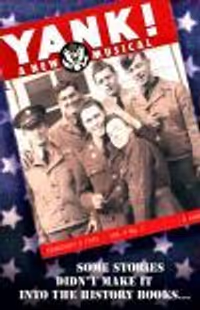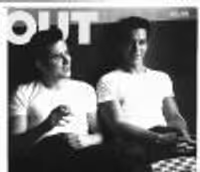"...the most powerful screen adaptation of a major American play since ... 'Streetcar Named Desire'..."
FindingNamo
Broadway Legend Joined: 7/22/03
#0"...the most powerful screen adaptation of a major American play since ... 'Streetcar Named Desire'..."
Posted: 11/17/03 at 8:34pm
Yesterday, Frank Rich took on "Angels, Reagan and AIDS in America," in the New York Times.
He says the HBO "Angels in America" features a "career making performance" by Patrick Wilson as Joe Pitt. He also does a compare and contrast of the people who harangued CBS into pulling their Reagan biopic, guess what they were doing in Reagan's era? "Neither CBS nor those who intimidated it can suppress the story of just what happened in America in the 1980's, a time when too many died in secret and too many of those who might have helped looked away."
Check out the article, it's free and a snap to register.
Link
#1re: '...the most powerful screen adaptation of a major American play since ... 'Streetcar Named Desire'...'
Posted: 11/17/03 at 8:54pm
I agree, a particularly powerful Rich piece. The timing of Angels on the heels of the Reagan miniseries cancellation has a delicious irony. OT: I was especially fascinated with Rich reporting on the ire raised among the Reagan kids, when two of them made mega bucks writing Mommie/Daddy Dearest tomes. Now they've had rapprochement with the ailing family, and don't want anyone ELSE to say a negative word -- after they were paid handsomely for their nasty reports. Patti, in particular, is a huge hypocrite. If the networks had considered buying her lurid book for TV, she would've entered a bidding war as fast as she stripped for Playboy. Talking about extending your 15 minutes...
As for this potentially mesmerizing version of "Angels," in the words of our current prez, Bring it on.
MusicMan
Broadway Legend Joined: 5/16/03
#2re: re: '...the most powerful screen adaptation of a major American play since ... 'Streetcar Named Desire'...'
Posted: 11/17/03 at 9:10pmToo bad ANGELS isn't ultimately as cohesive a play as STREETCAR. Its resolution is a disappointment and doesn't fulfill its compelling premise. Perhaps the teleplay rectifies that flaw. We shall see. Updated On: 11/17/03 at 09:10 PM
#3re: re: re: '...the most powerful screen adaptation of a major American play since ... 'Streetcar Named Desire'...'
Posted: 11/17/03 at 9:17pmI personally agree with Musicman. I remember the hiatus between part one and part two. I was stunned by the first half. 6 months later ... when I went back for part 2, I thought it was bloated and repetitive, and -- big subj -- as a playwright, he turned on his own character, poor Joe Pitt. He judged him without finding a satisfying ending for his story, IMO. (People may disagree -- maybe we should wait and see how it works in the mini?) Yes, there are harrowing parts in part two -- the death of Roy, etc. -- but there was way too much of that loquacious angel, whose brief appearance was enthralling in part one (it's like the ALIEN movies -- once you've seen the Alien, all you can do ... is see it again. None of the Angel's babbling/Peter Pan wire effects compared to her simple, eloquent curtain line at the end of one). Less is sometimes more. But then, Mike Nichols is savvy, so perhaps the reshaping for the camera has resulted in trims. I expect floodgates to open, outrage from fans who love the 2nd half.
FindingNamo
Broadway Legend Joined: 7/22/03
#4re: re: re: '...the most powerful screen adaptation of a major American play since ... 'Streetcar Named Desire'...'
Posted: 11/17/03 at 9:17pmYeah, too bad. Unless it was just you. In which case it IS too bad.
MusicMan
Broadway Legend Joined: 5/16/03
#5re: re: re: re: '...the most powerful screen adaptation of a major American play since ... 'Streetcar Named Desire'...'
Posted: 11/17/03 at 9:23pm
You have to forgive FindingNamo, Auggie, he/she consistently forgets to take his/her medication. Just ignore him/her.
#6re: re: re: re: re: '...the most powerful screen adaptation of a major American play since ... 'Streetcar Named Desire'...'
Posted: 11/17/03 at 9:32pm
A friend damn near stopped speaking to me after I was unmoved by "Peristroka," part two of Angels. At the time, it was so ... not done ... to have any negative thoughts about Mr. K's opus.. The play itself was like that angel crashing through the ceiling. You had to stand in constant awe of it, or be thought of as heretic.
It resulted in a new catch phrase among my pals, "please don't report me to Tony Kushner!" every time I said something non PC.
Whatever. I hope the mini is blistering. There's a ton of great stuff the play, no doubt. A ton, perhaps, is the operative word. For some of us.
#7re: re: re: re: re: '...the most powerful screen adaptation of a major Amer
Posted: 11/17/03 at 9:32pmNever saw the original on Broadway ( along with many shows I did not see ) so it will be an experience but will not be able to compare it to the original. The promos make it look good so we shall see.
FindingNamo
Broadway Legend Joined: 7/22/03
#8re: re: re: re: re: '...the most powerful screen adaptation of a major American play since ... 'Streetcar Named Desire'...'
Posted: 11/17/03 at 9:33pm
No, I loved the second half and it doesn't anger me that you didn't Auggie. I just can't take oppositional MM seriously.
I've seen several productions, one of my favorites being the Oskar Eustis-helmed Trinity Rep production. There were no wires. The angel was held aloft and tossed around by black clad people who resembled ninjas. It was quite lovely.
I never really thought about there being no resolution to the Joe character, because I always felt there was no satisfactory ending for that type in the world. So it didn't bug me, because that type of person interests me less than the people Kushner does focus on.
I was surprised to see that Rich implies the women have less to do in part two, since I think Harper's speech on the play at the end is one of the best in the show.
#9re: re: re: re: re: re: '...the most powerful screen adaptation of a major American play since ... 'Streetcar Named Desire'...'
Posted: 11/17/03 at 9:52pm
Namo: You're making me want to look at the entire piece with new (older, to be sure) eyes. I guess I felt Joe was so empathetic in part one, we were on his journey, too, as he entered Cohn's world, etc. He was so bewildered -- in some ways an innocent of sorts -- I truly cared about him, I must admit. I thought we'd at least see him more tragically. It felt like he was dealt a kind of slap by Kushner. Maybe he wanted Joe to be a living/breathing cautionary tale. I do need to see it again, as noted. But you're right -- Harper has a fascinating place to end up. That speech where she's flying (yikes, from memory! Maybe I'm wrong). And Marcia Gay Harden was brilliant.
The bottom line for me was/is the overall scathing portrait of the times, of the critical look at the decade. A shallow decade that had too little analysis. I remember feeling the same way about Kramer's NORMAL HEART, when he dared to take on the current mayor of NY. The Rich piece really excited me about the political ramifications of mini -- but so has the trailer being shown in NY theaters. The play's biggest achievement -- the Roy Cohn character -- seems to be fully realized on screen via Pacino.
We should all have a very spirited debate here, after 12/7 and 12/14, when the HBO film is shown. Needless to say, I'll be taping this one. Isn't it amazing that it got made? (Kushner wanted Altman, but in a way, I think the Nichols NY sensibility better serves.)
Dollypop
Broadway Legend Joined: 5/15/03
#10re: re: re: re: re: re: re: '...the most powerful screen adaptation of a major American play since ... 'Streetcar Named Desire'...'
Posted: 11/17/03 at 10:12pmThe comments about ANGELS might be very valid in Rich's article, but I have to say that the original screen adaptation of STREETCAR is horrible. The text is so horribly watered down that it's laughable. I must hasten to add that the acting is luminous, though.
Gothampc
Broadway Legend Joined: 5/20/03
#11re: '...the most powerful screen adaptation of a major American play since ... 'Streetcar Named Desire'...'
Posted: 11/17/03 at 10:15pmWhat I felt slowed down Part II were the scenes in the Mormon Welcome Center/Wax Museum. They seemed to slow down the show and not lead anywhere. That may be my not understanding their purpose, but I felt that Part II wasn't as interesting overall as Part I.
#12re: re: re: re: re: re: re: re: '...the most powerful screen adaptation of
Posted: 11/17/03 at 10:16pm
Most of Williams screen adaptations are watered down
Take "Cat On A Hot Tin Roof" & go on to "Sweet Bird of Youth" . It is a shame with the great casts in both that the screen adaptations were not truer to their souce. Having said that even watered down Williams is great. Think SBOY would make great musical material.
FindingNamo
Broadway Legend Joined: 7/22/03
#13re: re: re: re: re: re: re: re: re: '...the most powerful screen adaptation of
Posted: 11/17/03 at 10:22pmNot to mention Suddenly Last Summer. That was a watered down as the champagne at an 8th Avenue strip bar. Not that I'd know.
Dollypop
Broadway Legend Joined: 5/15/03
#14re: re: re: re: re: re: re: re: re: re: '...the most powerful screen adaptation of
Posted: 11/17/03 at 10:31pm
Opening scene from SWEET BIRD OF YOUTH:THE MUSICAL--
The townspeople are gathered on the town square as the cirtain rises. Then they start singing, (to the tune of "Tradition"):
"Castration, castration!!!!
Castration, Castration!!!!
At first Wayne Chance enamored her
But then he went his way
We think we know what's best for him
Of course, it's simple:
Castration, castration!!!!!"
#15re: re: re: re: re: re: re: re: re: re: '...the most powerful screen adaptation of
Posted: 11/17/03 at 10:39pm
Does anyone know what this play is about? Is it a musical? Is it based on that Hailey Mills movie THE TROUBLE WITH ANGELS? I thought that took place in England, though, cuz they all talked pretty funny, like. ![]()
How can Rich say this is the best screen adaptation since STREETCAR? I mean did he not see CRIMES OF THE HEART and STEELE MAGNOLIAS?
Seriously, though, this is a very interesting article. I particularly appreciated the irony of Nancy Reagan asking for stem cell research because it might help Ronnie with his Alzheimer’s. Basically accusing the Bush Administration of wasting precious time when it could be saving lives. If it weren’t so sad it would be hysterical.
As for ANGELS IN AMERICA, the stage production was eight hours, if I recall, and the film version is only six. I suspect Kushner and Nichols have done some tweaking and condensing some of the more awkward portions of the original.
I for one cannot wait to see this and everyone of the “younger” posters on this board should go out of their way to see it, also.
Sueleen Gay
FindingNamo
Broadway Legend Joined: 7/22/03
#16re: re: re: re: re: re: re: re: re: re: re: '...the most powerful screen adaptation of
Posted: 11/17/03 at 11:02pmAnd I KNOW you mean me, youngster that I am, Sueleen. But serialmonogamly, I think each part was three hours in the theater... the touring production was actually a bit longer with a couple more scenes taking place in heaven that were cut from New York so the curtain would ring down by 11.
logan30
Stand-by Joined: 8/26/03
#17re: re: re: re: re: re: re: re: re: re: re: re: '...the most powerful screen adaptation of
Posted: 11/18/03 at 10:55amLike some previous posts, I thought Millenium Approaches was the most amazing play I had ever seen but in Perestroika, TK got a little too pedantic, too much sermonizing by all them angels, and I too was bothered by the fact the Joe Pitt was basically just left hanging. This was someone many in the audience had come to care about during the course of the two plays. In the play's coda, I'd like to have found out what Joe Pitt had been up to the past five years.
FindingNamo
Broadway Legend Joined: 7/22/03
#18re: re: re: re: re: re: re: re: re: re: re: re: re: '...the most powerful screen adaptation of
Posted: 11/18/03 at 11:01amI liked that Joe's was the untidy loose end. I think that's because Roy was his template. And there was nothing that we saw that would lead us to believe that Joe was going to be any different than Roy. MAYBE a little more compassionate, but not by much. I think, though we were made to care for him because he was well fleshed out in the writing, we're left to make up our own minds about what happened to him and that he was definitely more Roy than like the other gay men we've met.
#19re: re: re: re: re: re: re: re: re: re: re: re: re: re: '...the most powerful screen adaptation of
Posted: 11/18/03 at 11:08am
Namo, you may be right about the running time. I saw the tour twice and have read the script as many times. I still feel that in adapting a play there are short cuts one can take (showing the sunrise, as opposed to describing it)and I am sure they took care of some of the more awkward portions of the script.
As for Joe, I agree with you totally. It is Harper's journey that I was more interested in. Joe was a very sad and pathetic gay man. I think we all know what happens to him without having it be spelled out for us.
#20re: re: re: re: re: re: re: re: re: re: re: re: re: re: '...the most powerful screen adaptation of
Posted: 11/18/03 at 11:35am
I inadvertently started this end-of-Joe Pitt-thread, and I'm learning a lot about the power of the play's ambiguities from the discussion.
I think you're right, Namo. Kushner masterfully -- perhaps subversively? -- involved us in Joe's identity crisis, and then purposefully left us to ponder his exit from the canvas, so everything wouldn't be tied up in a bow.
Me, I remember how strong of an impression David Marshall Grant made on b'way. His relationship with the Mantello character was movingly real. He was so palpably green, uncomfortable with intimacy, didn't know the "language" to explore the feelings overtaking him. It was compelling, and he had a certain quiet star presence in part one. Since one can never fully divorce an actor from the role, perhaps it was Grant's quiet exit from the show that shook me.
I look forward to seeing what Wilson does. Rich suggests the role will make him a star, so the alchemy between actor/part may give us all a new look at Joe Pitt.
#21Speaking of Kushner
Posted: 11/18/03 at 11:43am
...whatever happened to his "Laura Bush" play , wherin the First Lady reads poetry to massacred Iraqi schoolchildren?
I'd love to see a staging of that.
#22re: Speaking of Kushner
Posted: 11/18/03 at 12:26pm
Great role for Delta Burke, after TMM: Laura Bush.
FindingNamo
Broadway Legend Joined: 7/22/03
#23re: re: re: re: re: re: re: re: re: re: re: re: re: re: re: '...the most powerful screen adaptation of
Posted: 11/18/03 at 12:33pm
I agree with you about Grant. I think that's what made his disappearance so wrenching the first time I saw the show. He was absolutely great. But I think character-wise, the ambiguousness of his outcome make sense for such an ambiguous/cowardly man.
And I also agree with you Sueleen that I expect all sorts of things to be different in the movie, but with the incredible essence remaining.
#24re: re: re: re: re: re: re: re: re: re: re: re: re: re: re: re: '...the most powerful screen adaptation of
Posted: 11/18/03 at 6:34pmThe Marshall Grant/Joe Pitt comments are right on. i think many gay men identified with him, but his ambigous stance made the entire audience see parts of the character that they identified with. It was harder to identify with Harper because of her drug use; almost anyone can project being unfaithful, few can project being an addict. Regardless, Grant's amazing work drew the majority of the audience in. As the themes enlarged in the second half of the pairing, the focus on individual characters had to make room for them, which might have suggested that the individual journeys got lost. Instead, for me, they moved out and engulfed aspects of society even more. It helped, of course, that i had seen several versions of the first half and read/studied the text before seeing the complete cycle.
Videos






